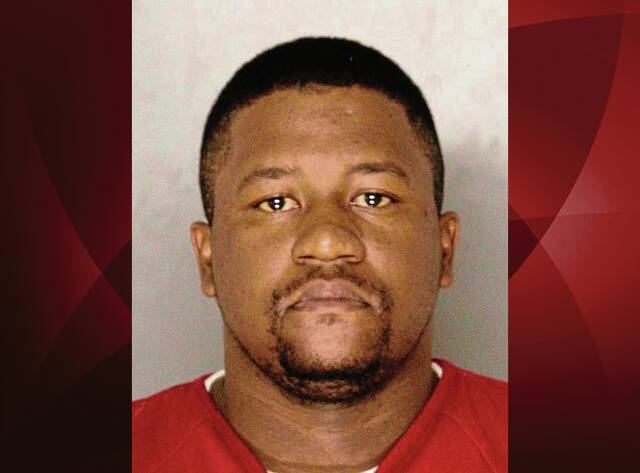A judge Wednesday refused to throw out a death penalty case in a Pittsburgh triple killing despite finding that prosecutors failed to turn over evidence to the defendant.
As a result, the jury trial for Ronald Steave will go forward Monday in Allegheny County Common Pleas Court.
Steave, 32, is accused of killing his ex-girlfriend Nandi Fitzgerald, 28; her son, Denzel “Buddy” Nowlin Jr., 12; and Tatiana “Tay” Hill, 28, on New Year’s Eve 2021. Steave had a different child with Fitzgerald.
Steave’s lawyers tried to get the case dismissed, claiming that for more than two years, the Allegheny County District Attorney’s Office did not turn over a recording of a statement their client gave police that blamed Fitzgerald for the killings.
A former prosecutor who took the witness stand acknowledged the error but said it was accidental.
The defense agreed that withholding the evidence wasn’t malicious but still asked that the charges against Steave be dismissed.
Allegheny County Common Pleas Judge Edward J. Borkowski declined, saying that the violation did not rise to the level of prosecutorial misconduct that would warrant a dismissal.
‘He was mumbling’
The case began when police were called to a row home on Hamilton Avenue in the city’s Homewood section around 4 a.m. on Dec. 31, 2021, after neighbors reported hearing gunfire.
Officers found Fitzgerald dead just inside the front door. Her son appeared to have been hiding behind a door. Hill was under a bed.
Steave was charged on Jan. 6, 2022, but not arrested until March 24, 2022.
That day, Pittsburgh police interviewed Steave. Detectives Janine Triolo and Artie Patterson testified that they read him a Miranda warning and asked if he wanted to talk to them.
According to a transcript of the interview, Steave said, “No.”
But Triolo testified Wednesday that to her, it wasn’t so clear.
“He put his head down and sort of just mumbled,” Triolo testified. “I didn’t take it as declining.”
Patterson also testified that Steave’s answer was vague.
“We really couldn’t understand him,” Patterson said. “He was mumbling.”
The detectives kept questioning Steave for more than three hours.
Eventually, Steave told them he was in the house when the victims were killed, but that Fitzgerald killed her son and Hill before shooting herself.
Triolo testified that by the next day, she had told then-Deputy District Attorney Stephie Ramaley about Steave’s statement.
But the defense didn’t learn about the statement until last month.
‘I don’t hide stuff’
Steave’s attorneys filed a motion to suppress it, alleging their client asserted his right to remain silent early on in the interview but was ignored by detectives.
They also filed a motion to dismiss the case against Steave because of prosecutorial misconduct.
Ramaley, who at the time was in charge of prosecuting Pittsburgh homicide cases, told the court she had been involved in the case involving the three victims since the day it happened. As soon as she heard what Steave said in his statement, she said, she set out to disprove it through forensic evidence.
Ramaley, who left the DA’s office last year, said she remembers telling Steave’s current defense attorneys, Frank Walker and Michael Machen, that their client made a statement, and she thought she turned the recording over.
“I don’t hide stuff,” she testified.
Ramaley testified that early on in the case she asked her office to make a new and complete copy of the records to give to Steave’s defense attorneys, but she never went through it herself.
“I was never aware that statement wasn’t in there,” Ramaley said.
During that period, Ramaley said, there were several multiple co-defendant homicide cases, and she was in two back-to-back death penalty trials.
Her office, she continued, was also down 20 prosecutors at the time.
“This was not willful,” Ramaley said. “We’re just human. We’re doing what we can.”
Ramaley apologized for not turning the recorded statement over to the defense.
“I feel horrible about it.”
Another motion pending
While Walker acknowledged the violation wasn’t malicious, he said the failure to turn over the recording warranted a dismissal of the charges.
“Mr. Steave was prejudiced by that,” Walker said.
Walker and Machen did not have a chance to do follow up testing of DNA evidence that might have assisted his defense. And in a motion, they wrote that the public defender who represented Steave at his preliminary hearing might have conducted his cross-examination of witnesses differently had he known about the recording.
Deputy District Attorney Brian Catanzarite conceded that there was a Miranda violation in obtaining Steave’s statement, when the detectives persisted in asking questions despite him saying he didn’t want to talk to them.
Catanzarite said the DA’s office would not seek to use the statement at trial.
Requesting dismissal of the case, however, was a step too far, Catanzarite argued.
“The evidence was turned over. It was turned over more than a month before trial,” Catanzarite said.
He suggested that the judge should either suppress the evidence or postpone the trial.
Also, the prosecution noted that Steave should have known he made a statement to police.
Borkowski, who ruled from the bench, denied the motion to dismiss the case.
Another defense motion will be heard Friday to bar the death penalty against Steave based on allegations the he has an intellectual disability.








